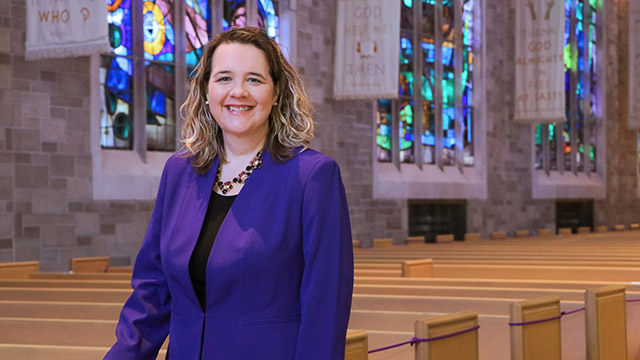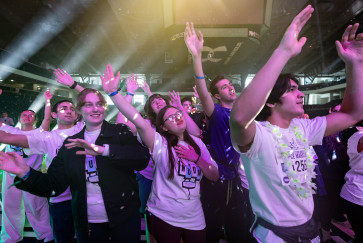The Rev. Kristen Glass Perez, Northwestern’s new chaplain, had a career epiphany in 2015. At the time, a student sitting in her office said, “I’m always so hungry.” As they talked more and built a relationship, Glass Perez began to see new opportunity in her work helping students navigate their college careers with grace and dignity.
As the University’s chaplain and executive director of Religious & Spiritual Life, Glass Perez describes her work as traveling alongside someone as life happens — not as we wish it would, but as it actually happens.
That mindset illuminates the far-reaching goal of Religious & Spiritual Life (RSL), within the division of Student Affairs, to be full partners in the student experience. The department offers students emotional and spiritual support, making space for exploration and growth as one journeys through life at Northwestern. It also helps with tangible things, such as connecting students to campus and community resources for mental health, food and other support. During winter and spring quarters, RSL hosted Campus Kitchen in Parkes Hall. This student group collects excess food from dining halls and redistributes it to Evanston residents in need.
What does it look like for the University — for all of us — to offer radical hospitality?”
University Chaplain
After two years as college chaplain at Muhlenberg College in Pennsylvania and six years as chaplain and director of vocational exploration at Augustana College in Illinois, Glass Perez came to Northwestern in October. She succeeded Timothy Stevens, who had served the University as chaplain for more than 30 years.
Her new RSL team of six includes an associate chaplain, a music director, an associate director and a new part-time Hindu chaplain, Amar Shah ’16, who is the first person to hold this role at the University.
There are more than 30 Northwestern student organizations dedicated to various religious traditions, including Baha’i, Christian, Hindu, interfaith, Judaism and Islam. Alice Millar Chapel, lit through giant stained glass windows at the front, is a centerpiece for campus worship, celebration and music featuring the chapel choir in concerts throughout the year, including HymnFest, Lessons and Carols, the Alice Millar Birthday Celebration and the Spring Festival Concert. One of the signature faith-based events, the Baccalaureate Service, takes place each year before Commencement and is an interfaith service that incorporates many traditions.
As she continues in her first year at the University, Glass Perez discussed with Northwestern Now the work of the Religious & Spiritual Life team during the pandemic, meeting students’ needs and the importance of continuing to build community no matter what the obstacle.
How has worship been complicated during COVID-19?
It’s been very hard on religious communities. So much of what we do centers on gathering for ritual, which often includes singing and even eating together. As has been the case for many, the pandemic forced us to look at what we do in new ways. But there have been wonderful gifts to come from the process. Students can join in ways that are more accessible than ever before. Families and friends can join in worship, too. Remote programming has enabled us to gather participants from the Evanston, Chicago and Doha campuses, all in one space. One of my favorite programs this year was the Wildcat Vigil. Hosted by RSL right before the 2020 election, the vigil was a nine-hour block of continuous programming on Zoom. Religious student groups and faith leaders from all over campus took turns hosting brief sessions of prayer, meditation, poetry and music.
Have you come up with safe ways to gather in person?
Yes, one of the things I’m especially proud of is how the RSL staff worked hard to keep all of our chapels and prayer spaces open for students with Wildcard access this year. Following health and safety protocols, we’ve offered in-person Jummah prayers for Muslim students, individual prayer sessions for students, weekly virtual services in Alice Millar Chapel and virtual mindfulness reflection. We’ve also held in-person and virtual music rehearsals. From my office each Friday afternoon, I’ve been able to listen to the Baroque Music Ensemble practice, socially distanced, of course. It reminds me there’s always the opportunity to hold hope in tandem with reality.
How have you utilized social media?
In winter quarter, we hosted a 40 Days of Spiritual Wellness program. One of my favorite pieces of this series was 40 days of reflection on Instagram by members of the Northwestern community, based on “Mindful Pilgrimage,” a small book of quotes and wisdom from interfaith and interspiritual leaders. In May, we’ll explore a series on Spiritual Ecology, which invites us to deepen our own reflection about our connections with the Earth and with each other, through programming on Instagram and Zoom, as well as an in-person guided tour of the Evanston campus with Adam Kessel, an urban ecologist, indigenous activist and the author of “Zombie Gardening.”
Why does the chaplain’s role suit you?
I have a liberal arts education. Looking through multiple lenses has served me well as I think and collaborate across disciplines. I’m used to pulling disconnected things together so, for example, how do you engage when the majority of a population — take 18- to 30-year-olds for example — does not identify with any particular religious faith or tradition?
So your focus goes beyond faith?
It does. Sometimes I just think of it as basic needs work. In the past, I’ve focused on economic hardship or issues of access that are particular to first-generation students, those who may not be as familiar with the college process. I’ve helped establish on-campus pantries, food recovery efforts and expanded emergency loans and grants for school supplies, experiential learning or even minor car repairs. Very often, something small can make a huge difference in helping students be successful in school.
Can you go back to religious identity?
There is a spectrum, like anything, with some students who are connected very strongly to a religion and others who are not. But we’re not trying to trick you. We’re not trying to convert you. Our chaplains are trained in emotional and spiritual care. But if someone doesn’t have access to food, clothing, shelter or textbooks, that’s not healthy in any way. So how can we partner with other University departments and resources, and how can we be an advocate for those whose needs may end up keeping them from earning a degree?
How would you explain your mission?
I’ve met students who tell me that, because of COVID-19, they spend all of their time in the lab or they’ve been alone for nine weeks at a time in their apartment. That is really humbling. It reminds me that we can never stop this pursuit of inviting people into community.
Our mission is radical hospitality. What does it look like for the University — for all of us — to offer radical hospitality? So, even if we’re alone, how are we alone together? It’s convening. It’s time to be together. It’s meals. It’s reading. It’s emotional and spiritual care, with no strings attached. We want to extravagantly welcome folks, as they are, from multiple traditions, places, races, cultures, religions, gender expressions and identities.
We do all of that in a place filled with such a vast range of learners who are here for different reasons and on different timelines.
What do you do when you’re not working?
I love cooking. And I collect antique glassware, which is a weird thing. But I really love it. I have different teacups, and champagne coupes from the 1920s. I have my great grandmother’s Depression-era wine glasses in pink and green. I have a particular glass for everything. It’s just a part of me. It’s in my name!


